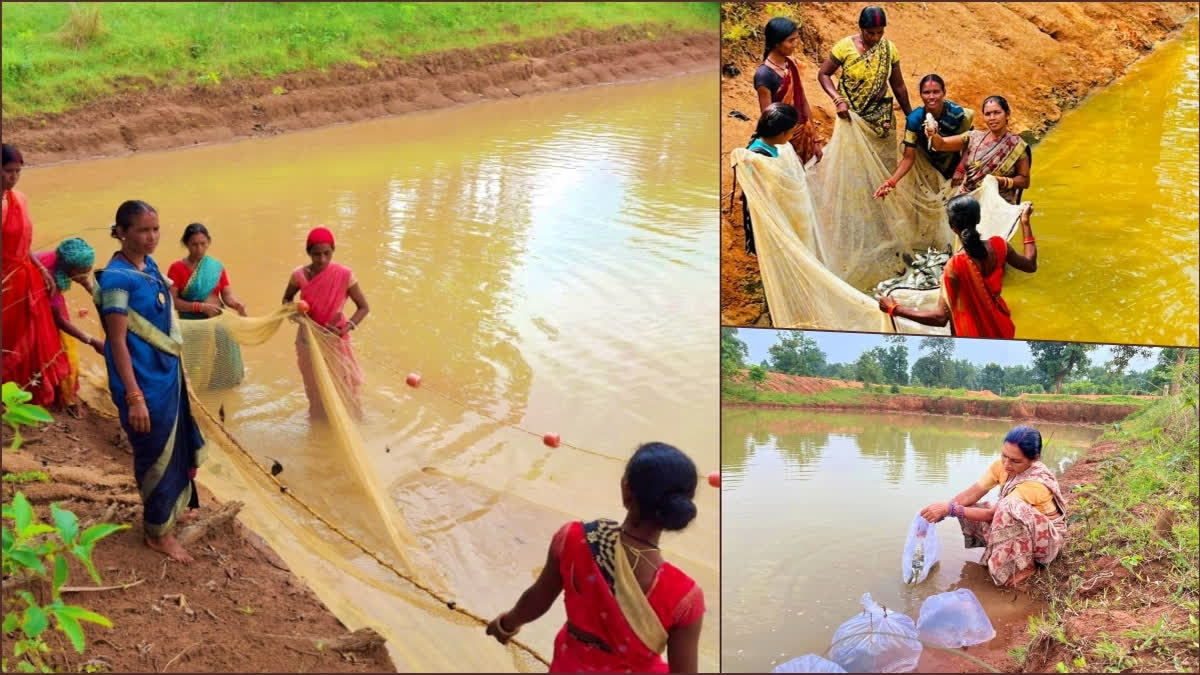In a region once known for its scarcity and seasonal migrations, the village of Masulpani in Kanker district has become a beacon of change, thanks to the innovative water conservation efforts led by the local women. The Masulpani Gram Panchayat was recently awarded second place among the country’s top panchayats for water conservation initiatives, a national honour presented by President Droupadi Murmu on October 22.
Transforming Villages Through Water Management
Once plagued by water shortages, the village’s journey began in 2014 when Masulpani became the first in the area to implement water conservation projects. These initiatives aimed to capture and retain rainwater flowing from the nearby hills. The success in Masulpani soon inspired surrounding villages including Devgaon, Dhaurabhantha, Badal, Dabena, and Surhi to adopt similar techniques.
Innovative water conservation efforts led by the women of Masulpani in Bastar (ETV Bharat) The villages collectively constructed a series of water structures: 29 brushwood structures, three loose boulder structures, and two check dams in Surhi. They also built similar facilities in Devgaon, including eight loose boulder structures, three gabions, 12 gully plugs, and two stop dams. With over 277 water bodies created, the area has been transformed, bringing self-sufficiency to its farmers and preventing the seasonal migration that once saw nearly 75% of families leave in search of work.
A Self-Reliant Community
Where once families grew only one paddy crop a year, they now cultivate two, along with a diverse range of crops such as vegetables, pulses, oilseeds, and millets. Masulpani has even developed a thriving fishery industry, with 167 ponds, including 90 private and 50 government-maintained ponds, supporting fish farming that generates substantial income for the villagers. Said Sulochana Sahu, a resident who's actively involved in the projects, “Each household can now earn around 80,000 to 85,000 rupees annually just from fish farming.” Many villagers have expanded their livelihoods to include goat and pig farming, turning the village into a model of rural self-sufficiency.
The women's water conservation efforts have put Masulpani at second place in the Best Village Panchayat category (ETV Bharat) The Role of Women in Leading Change
The success of Masulpani’s transformation can be attributed largely to its women, who spearheaded awareness programmes on efficient water use and conservation methods. They organised community events and discussions to educate villagers on maximising the benefits of water resources. "We wanted to ensure that the village would never face water scarcity," one of the women leaders shared. Through these efforts, the villagers not only overcame the water crisis but also embraced fish farming as a lucrative enterprise, with many earning substantial incomes.
The Community Effort and Administrative Support
With the support of local administration, including Kanker Collector Nilesh Kshirsagar, Masulpani has built 161 watershed structures, including 99 farm ponds, brushwood barriers, community pond desilting, wells, underground dams, and gabions. These projects have reduced the village’s reliance on groundwater by enabling the use of surface water for irrigation.
The village has gained self-sufficiency in this resource (ETV Bharat) Collector Kshirsagar remarked, “This achievement is a proud moment for Kanker and our state. Any government scheme only succeeds when the community participates actively. Masulpani has exemplified this through its water conservation projects.” The achievements of Masulpani and its surrounding villages have earned them a spot among the top panchayats in the nation, a recognition of their exemplary water conservation efforts.
